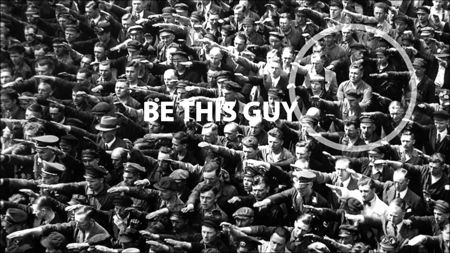- 1906 - Born the oldest twin, his sister was named Sabine
- German Churches were all in for WW I. German churches disgraced and discredited afterwards by Germany's humiliating defeat. The tribal "God is on our side" myth was trumpeted by all sides in WWI.
- Dietrich's older brother Walter was killed in WW I
- The Bonhoeffers were a very close, but very secular family
- This secular family was very surprised by Deitrich's choice to study Theology
- Deitrich greatly influenced by Karl Barth's writing about how WW I nations all claimed God as a tribal God fighting on their side
- Completes doctoral thesis at 21, Sactorum Communico--a new vision of the Church
- 1930, Bonhoeffer visits America on a teaching fellowship
- Studied under Reinhold Niebuhr at Union Theological Seminary
- Initially rejected Neihbuhr's teaching
- At the invitation of a black fellow student, Frank Fisher, Dietrich has a life-changing experience at Abyssian Baptist Church. He discover s poor people, disenfranchised people involved In enthusiastic worship of God
- He also becomes friends with and is influenced by a French pacifist, Jean Lessarce
- 1931, Summer - Returns to Germany
- 1933, Feb 1 - Delivers radio speech critical of Hitler two days after Hitler became Chancellor of Germany: "The Younger Generation's Changed View of the Concept of Fueher." The broadcast was cut off in the middle.
- The Church's support for Hitler brings it back into the mainstream
- Regional churches band together to establish the First United Reich Church of Germany
- Bonhoeefer teaches Theology in Berlin
- Anit-Jewish Sentinment, dating back to Martin Luther, including his The Jews and their Lies, blazes through Germany and Austra
- Defending Luther: Is there really a difference between Anti-Judaism and Anti-Semitism?
- At his Bishop's request, refuses to speak at the funeral of his Jewish brother-in-law's family. His guilt over this act of submission and cowardice haunted him the rest of his life.
- Dietrich's new view on an increasing resistance to the state
- Question the state's actions
- Minister to the victims of the state's injustice
- Jam a spoke in the wheel of the state
- 1933, The Catholic Church originally opposed Nazism, but eventually signed a concordant with them.
- The Bishops believed Hitler was a Catholic, and that his Catholicism would restrain him; that they might even exert a positive influence on him over time.
- They saw Nazism has a barrier against Communism, which was overtly atheistic and anti-church.
- The Aryan Paragraph
- Forbid any one with Jewish ancestry to hold public office or a government job. This affected pastors and priests because they were government employees paid from the Church Tax.
- Joachin Hossenfelder was a Church leader who actually outperformed the Nazis in pushing this policy.
- Those in the Church who resisted the Aryan Paragraph claimed it negated Baptism. Baptized Jews were Christians, not Jews. (Most German Protestants viewed Baptism in the way many American Evangelicals view the Sinner's Prayer, i.e., salvation and the adoption into God's family.)
- Pastor Karl Themer, an enthusiastic Nazi collaborator, goes through thousands of Baptismal certificates in order to identify those indicating Jewish ancestry. 2600 of these baptized Christians wind up in concentration camps.
- Martin Niemoller, a WW I hero and prominent Berlin pastor formed a protest against Nazism. Rebelling against the Reich Church, he and others founded the Confessing Church.
- About 7k out of 20k German pastors become part of this resistance.
- For many of these pastors, it was an intra-church squabble more than a direct confrontation with the Nazi state.
- Within 2 years, most of these pastors had pledged alleigance to the Nazi state.
- The continued resitors were jailed or drafted into the German Army and sent to the Russian front.
- Dietrich goes to London to pastor a German Church
- 1934, Karl Barth and 100+ pastors draft the Barmen Declaration, a return to Biblical principles
- Dissident pastors are harassed and jailed
- 1935, Confessing Church starts its own seminaries; Dietrich becomes director of Finkenwalde seminary
- 1936, Dietrich becomes increasingly convinced of the need for the Church to stand up to the victims of the state
- Introduces Negro spirituals into Confessing Church worship. His experience with American negroes leads him into supporting the Jews
- While at Finkenwalde, finishes The Cost of Discipleship
- Also at Finkenwalde, he is befriended by an elderly woman financial supporter, Ruth von Kleist-Retzow.
- 1937, the Gestapo closes Finkenwalde Seminary
- 1937, March, Pope Pius XI’s releases anti-Nazi papal encyclical Mit Brennender Sorge ("With Burning Anxiety"). This results in the Nazis ramping up their war against Catholicism and the Catholic resistance to the government pressure.
- 1938, Krystallnacht: hundreds of Jewish shops and synagogues are destroyed all over Germany. Otto Dudzes, a former seminary student of Dietrich's, says Bonhoeffer viewed this as an "attack on the God of the Old and New Testament and the Christian Church."
- Bonhoeffer's entire family becomes deeply involved in the Resistance. Dietrich's brother-in-law worked with the Abwehr (German military intelligence), and provided theBonhoeffer family with the complete picture of those Nazi atrocities that were hidden from the general public.
- 1939, Karl Barth expelled from Germany; Martin Neimolloer put in a concentration camp; hundreds of dissident pastors jailed.
- 1940 Walter Brundmann et al (also enthusiastic Nazi collaborators) publish The Message of God, a De-Judaized New Testament. German hymnbooks were also De-Judaized. German Theologians had been speculating since around 1900 (long before Hitler) that Jesus was from an Aryan family living in Israel.
- American friends offered Bonhoeffer sanctuary at Union Theological Seminary. Before leaving, Otto Dudzes reports Dietrich asking, "Would you grant absolution to the murderer of a tyrant."
- Shortly after arriving in America, Deitrich realizes"I have made a mistake in coming to America. I will have no right to participate in the reconstruction of Christian life in Germany after the war if I do not share the trials of this time with my people. He boards the last ship back to Germany before the war begins.
- Beomes "The moral backbone of the German resistance...They looked to him for moral guidance, to help them overcome some of the scruples that they had, because in most instances, they had to violate their military oath, they had to lie, they had to be duplicitous, they had to plan murder, they had to kill the head of state."
- Becoming a member of the Abwehr, he acts as a double agent.
- 1943, While visiting his wealthy patron from Finkenwalde, Ruth von Kleist-Retzow, the 37-year old Bonhoeffer becomes engaged to her 17-year old grandaughter. Maria was a beautiful, devoted, and intelligent young woman who had lost her father and brother in the war.
- 1943, April 15, Dietrich is arrested by the Gestapo, Maria's sister reports that Maria has a premonition that something bad was going to happen to Deitrich that day and recorded that pemonition in her diary. It is 3 months before Maria is allowed her first prison visit.

- Deitrich begins reading the Bible cover to cover, as well as continuing his daily reading of the Psalmss.
- At first, he is being held for suspicion of corruption, that he was making money from the Jews he was rescuing through the Abwehr. It is then discovered that he was a key figure in multiple assassination attempts on the Fuehrer.
- 1945, April 8, Moved to Flossenberg Concentration Camp.
- 1945, April 9, Deitrich Bonhoeffer is stripped naked and hung
- Hans Von Dohnanyi, his brother-in-law, , was hung with piano wire on the preceding (or same day, a records dispute) as Dietrich
- Klaus Bonhoeffer, Deitrich's brother, was shot in the neck by order of the Gestapo on April 22, 1945
- Rüdiger Schleicher, another brother-in-law, was shot in the neck by order of the Gestapo on April 22, 1945



